We are excited to start a new series of posts, which looks at the WFH rules, and regulations as well as tax breaks and allowances around the world. We kick off with a guide on working from home in New Zealand.
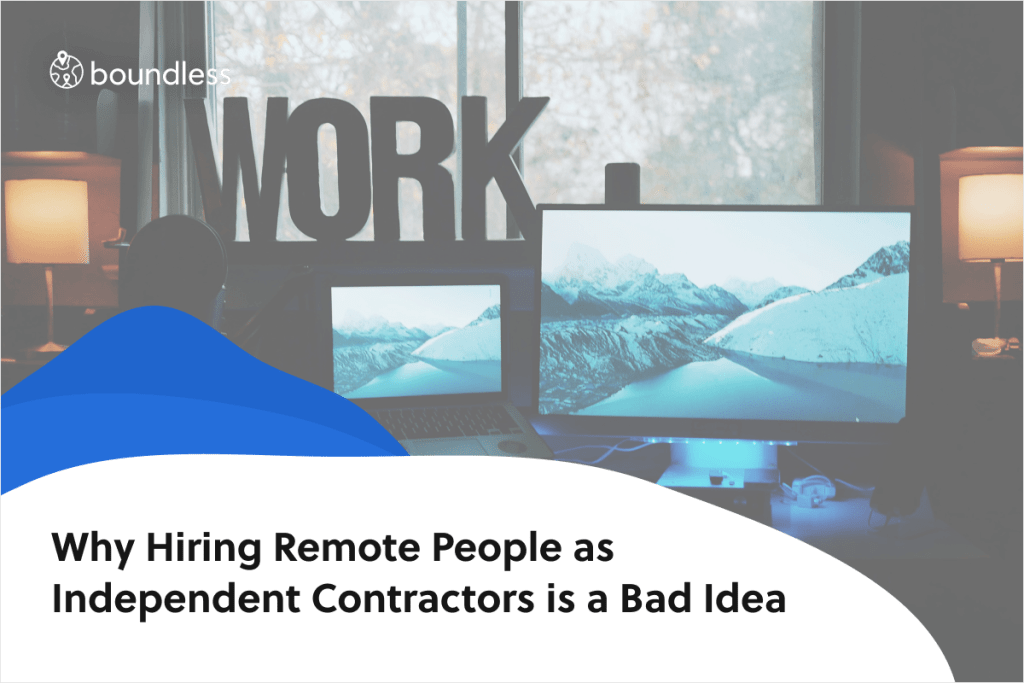
Albeit a common practice when working with remote workers, hiring them as independent contractors can have financial, strategic, reputational, and ethical repercussions.
This is the first of two posts on the subject of employment best practices. In the second post we explore the inequalities that can arise for your remote / international team.
As I walked onto the WebSummit Main Stage for my pitch about Boundless in November 2019, I had two questions for the crowd of nearly fifteen thousand. I asked the first out loud: “How many of you employ remote workers?” Blinded by the light, I could barely make out the hands that went up, but that was beyond the point; Remote working has exploded in the last few years so much that it made my question almost rhetorical.
My second question, however, was much more controversial, which is probably why I didn't directly pose it to the audience. "How many of you have these people working for you as independent contractors?" It's Remote Work’s “Gotcha Moment”; most distributed companies are breaking employment laws by having full time independent contractors.
The reality is that in most countries around the world, it's not legal or wise to have someone working as a full-time independent contractor long term.
Employment laws grant a set of rights to someone who provides a company with their full, undivided attention day in and day out. An independent contractor is stripped from all those rights, which creates a problem.
Regardless if a company has decided that someone is an independent contractor, the tax or employment authority will beg to differ if it deems that to be a misclassification. As a result, it will not only force the company to change the status of the individual but also will require backdated payments and very likely enforce penalties . And that's only one of the problems that a company hiring independent contractors faces.
Before you post your next remote job online, read this post to learn why distributed employees should not be independent contractors. And if you want to dig deeper into how to be a fully compliant distributed company, check this 10-step guide.
Understanding the distinction between an employee and a contractor is essential to get to the gist of the problem here. Employment is a legal relationship that is complex and requires fulfilling a plethora of regulations and protections that extend far wider than paying someone a salary. Contracting, on the other hand, is governed by a commercial agreement which governs the exchange of services for a fee.
Establishing and monitoring an employment relationship is necessary for the protection of employees, assuring all tax is filed and reported and employment laws abided by.
Governmental bodies in every country actively seek to make sure individuals are employed the right way and receive all their rights. One way most of them would see employment "done wrong" is if a company hires full-time workers as independent contractors because that directly strips them from those rights. It’s also seen as evading taxes and other payments they would be obliged to pay as an employer of people.
To negate that, employment authorities around the world have developed elaborate processes, checklists and questionnaires that help them determine the nature of the relationship.
Below is a list of some of the questions commonly asked by authorities when validating classification of workers as independent contractors v employees
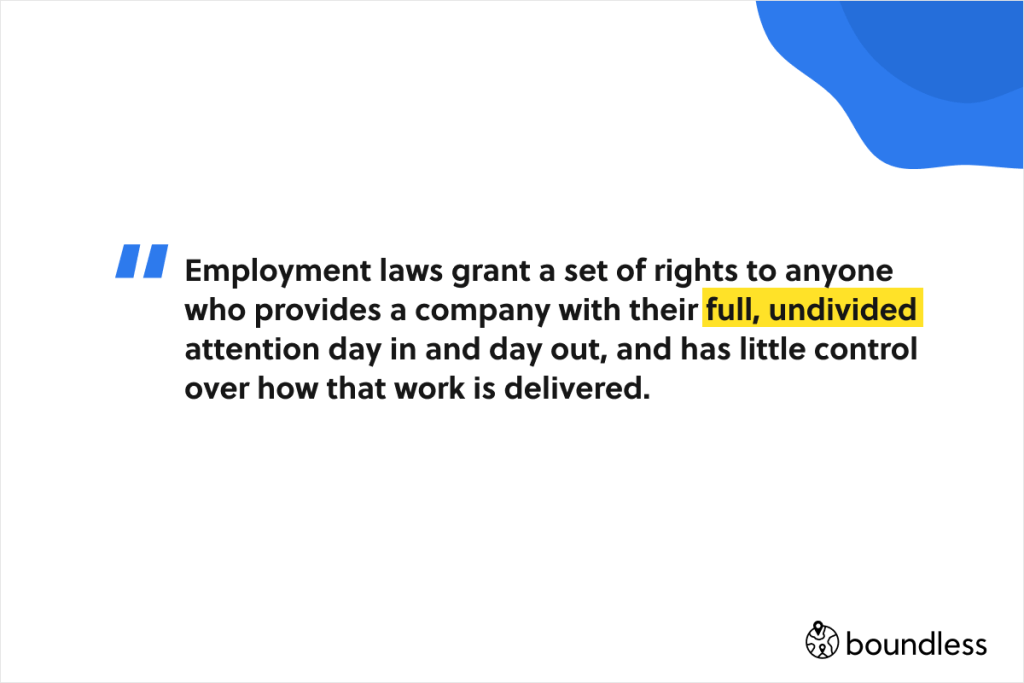
As you can see, all of these questions aim to establish the relationship between the individual and the company. Under some legislation, if even only two or three of the questions lean towards employment, an employer may be accused of misclassifying individuals.
An important thing to understand is that classification specified in the contract won't be taken into consideration when authorities will review the working relationship. Let's give a real example so you can see this more clearly.
In 2015, James Farrar, an Uber driver in the UK, filed a lawsuit against the ride-sharing company for an unlawful denial of employment rights and benefits. Just like all other Uber drivers, he was forced to be self-employed. According to his contract, he was running his own taxi business and Uber, a technology platform, was merely connecting him with customers. However, he claimed that the realities of how he was required to work for Uber meant he wasn't an independent contractor. The case was reviewed by the Central London Employment Tribunal in 2016, which found that Uber:
• interviews and recruits drivers;
• controls essential passenger information and does not share this with the driver;
• requires drivers to accept trips;
• sets the default route to be taken;
• sets the fare and the driver can only decrease it; the driver is not free to increase it;
• imposes conditions on drivers regarding the type of vehicle they can use, instructs them how to do their work and controls how they perform their work;
• uses rating systems to effectively performance manage/discipline drivers.
These factors indicated that Uber had a level of control over James that was consistent with him working for Uber, rather than providing a service. Drivers like him were not acting independently and autonomously, the way a self-employed contractor would. In October 2016, the tribunal delivered its verdict: James and all other Uber drivers were not independent contractors. They were entitled to workers' rights for the time the app was on and drivers accepted trips.
As is evident in the Uber case, the contract wording didn't matter, and Employment and Tax Tribunals will always investigate allegations of a potential discrepancy. It does not matter that the parties may not have intended to misrepresent the true nature of their relationship. They are still responsible, and measures will be taken.
Following the Employment Tribunal's decision, Uber appealed in a series of courts and lost each time. The UK Supreme Court is currently reviewing the case, and the employment status of its UK drivers remains unresolved. If found guilty, Uber will be forced to pay minimum wage and provide holiday and sick pay to all of its UK drivers going forward. [Update: On February 19th, 2021, the UK Supreme Court rejected Uber's appeal and ruled that Uber must classify its drivers as workers and not independent contractors in a unanimous vote. The practical effects of the ruling are not yet clear.]
In some cases, an employee that has won a Tribunal hearing will also backdate their claim to cover the period of the employment relationship. The financial repercussions of that can be dire for the company.
This is what happened to Sash Window Workshop, a window cleaning company in the UK. Conley King joined the company in 1999, working on a commission-only basis, receiving no pay when he was on holiday or was ill. When he left in 2012, he brought various claims to an employment tribunal, including a claim that he had been subjected to a series of unlawful deductions from wages for over 13 years.
The tribunal found that under the UK working time legislation, he was a "worker", and therefore entitled to annual leave with pay, or payment in lieu of leave. Once again, the judgment made it clear that Sash Window Workshop's ignorance on the employment status was no defence for not paying his holiday or sick pay. The company was forced to pay all his holiday time accrued, which was more than an annual salary. This became a landmark case that will be taken into account in all future cases when a contractor brings a company to court in similar circumstances.
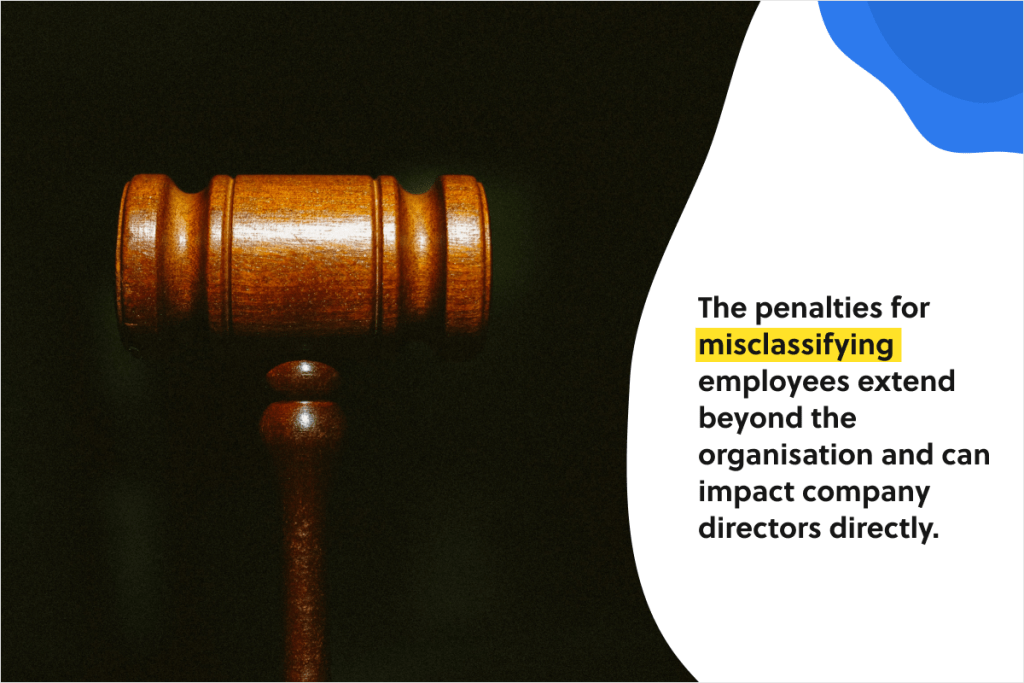
What’s important to understand here is that the danger of that happening, isn’t limited to gig economy or other service provider companies. Tech companies are as vulnerable and can be brought to Tribunals and courts by their independent contractors who deem they are not being employed fairly. The same rules apply, regardless of the industry or the line of work.
The repercussions and penalties of misclassifying employees extend beyond the organisation and can impact company Directors directly. In certain jurisdictions, they may be liable both for severe financial penalties as well as prison time. Below are two examples from two countries within the EU.
In France employers that misclassify employees face a fine of up to €45,000 for the company's legal representative (president or managing directors) and up to €225,000 for the company as a legal entity. In addition, the employer can be imprisoned for up to three years.
In Germany employers face fines of €30,000 for each hidden personnel leasing, up to €500,000 if the company is found to have done it intentionally.
In addition to that, an employer would be required to retroactively pay social security contributions for the employee without being allowed to deduct the employee's contribution from their salary for up to 4 years. In case of intentional misclassification, that could go up to 30 years, as well as a late payment fine, which generally equals to 1% of the due amount per month.
Moreover, the managing director in charge may be personally held liable under criminal law for wrongful non-payment of the employee's social security contributions. If found guilty, they could face a prison sentence of up to 5 years or personally be charged with some of the above fines.
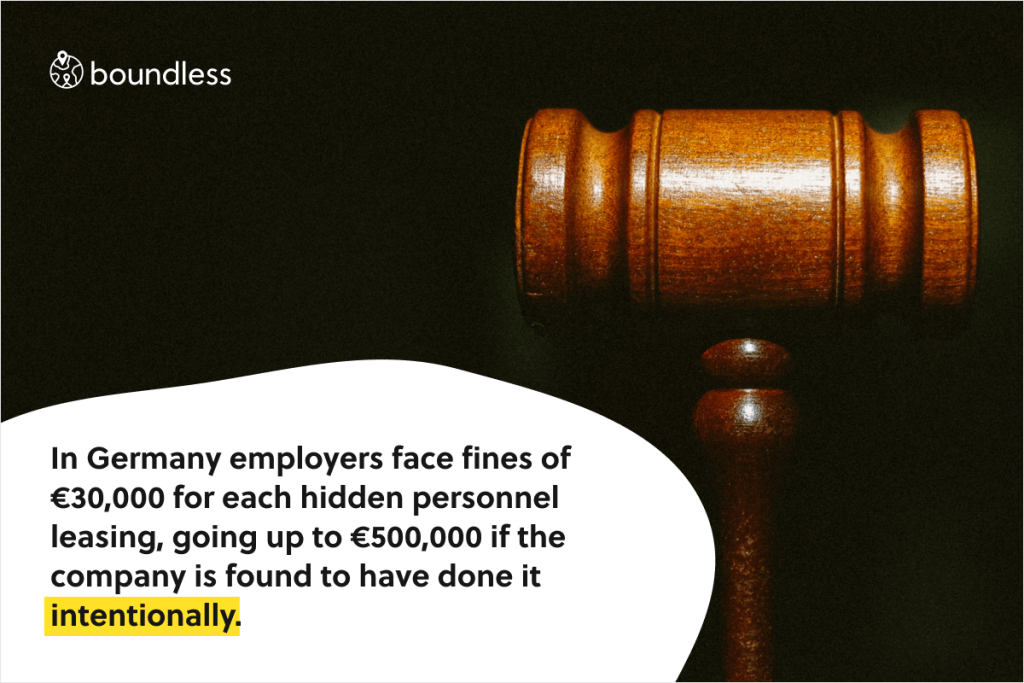
Beyond these financial penalties, companies with poor employment practices face non-financial ones such as a tarnished reputation as this becomes public knowledge. That is something that is already costing Uber and many other gig economy employers far more than whatever penalty courts impose on them. The more a company grows and the more high profile it gets, the higher the likelihood that these poor employment practices will garner the attention of the media. A recent investigation by The Verge, found that Pinterest had slashed holiday pay for its contractors, something the company used to offer historically. After the story went public and contractors raised the issue, Pinterest reverted their decision. You can argue, however, the damage had been done.
As public companies, Pinterest and Uber have to answer to boards, which often times would include VCs that have backed them. The higher the profile of the investors that sit on those boards, the bigger the pressure will be to avoid getting similar negative publicity or worse, getting tangled into messy legal cases.
Typically after funding rounds, the investors will join the company board. As executive or even non-executive members, they will be seen as having direct control or influence over the decision-making, potentially making them liable if the company fails to be compliant. That is why they will often push hard for the company to be legal and compliant. If they feel uncomfortable with the level of compliance, they could abstain from investing further.
Fast-growing and scaling companies that have not yet gone public are as susceptible to investor caution as, even at the point of Series A or B funding, conversations on the topic of employment compliance could come up in the due diligence process. Likewise, basic due diligence relating to acquisition or acquihire, will aim to establish that the team is employed in a compliant manner.
Beyond the financial and legal repercussions and potential legal cases, there is another reason why you should be very hesitant to hire people as contractors. If you do, it will mean that your company’s knowledge, expertise and experience behind your technology will have come from outsourced service providers, rather than your own team. This can be viewed as a real negative by potential funders and acquirers.
People invest in teams and, when prospective acquirors come knocking, more often than not, as well as acquiring your product/technologies, they will also want to acquire all of this expertise, and the bright minds behind your technology. Suppliers working for you via service agreements are not really on your team. So, when you talk about "your team and the expertise within”, contractors don’t fall within this.
Beyond any of the legal, financial, and knowledge base considerations in not hiring your remote employees as contractors, there is another, arguably more consequential reason than any of the others combined: it creates a class system in your ranks. A two-tiered system of employees and contractors creates a sense of second class citizenship, which will naturally bring negative feelings sooner or later and eventually impact company culture.
A friend who used to work for a big multinational in Dublin always told me how important getting his proper employment contract was to him. He had started as a contractor and was promised an employment contract down the line. That contract would not only give him a lot more protection but would also grant him access to learning and development resources, allowing him to do his job better.
As he waited, alongside many others like him, they felt increasingly less important to the company. In any situation like that, contractors would view full-time employees with increased resentment and never fully integrate. Such a class system should never be allowed to have a presence in the office.
Your success as a company depends on the output of people, their engagement and contribution. All these will deteriorate if people feel underappreciated. If you think that your contractors are happy and this doesn't apply to them, think again.
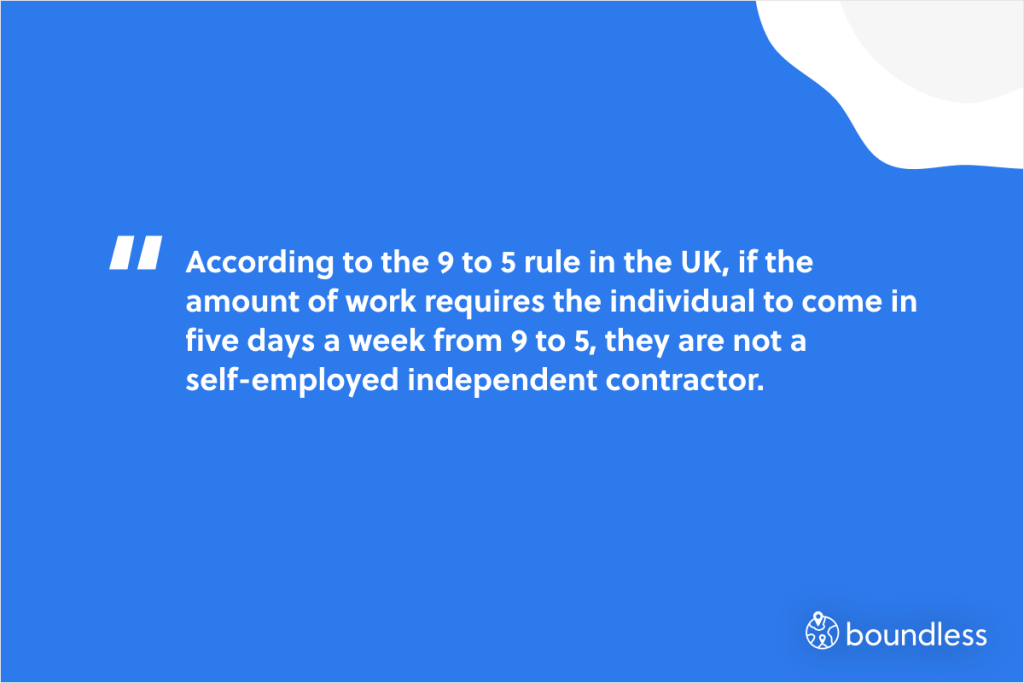
I hope all this has helped paint a picture why hiring independent contractors on a full-time basis is a bad idea. If you currently work with contractors Boundless can help you avoid these pitfalls and employ them full time compliantly. See more.

We are excited to start a new series of posts, which looks at the WFH rules, and regulations as well as tax breaks and allowances around the world. We kick off with a guide on working from home in New Zealand.

The most crucial aspect of international employment is understanding the law in the country where your employee is relocating. Every place has its own unique rules on your contractual obligations, statutory notice periods, taxation, and employee protections.

There are various laws and regulations that any employer in any country needs to comply with. Previously we talked about the dangers of misclassification, in this post, we would like to give you five clear reasons why you should be a compliant remote employer.
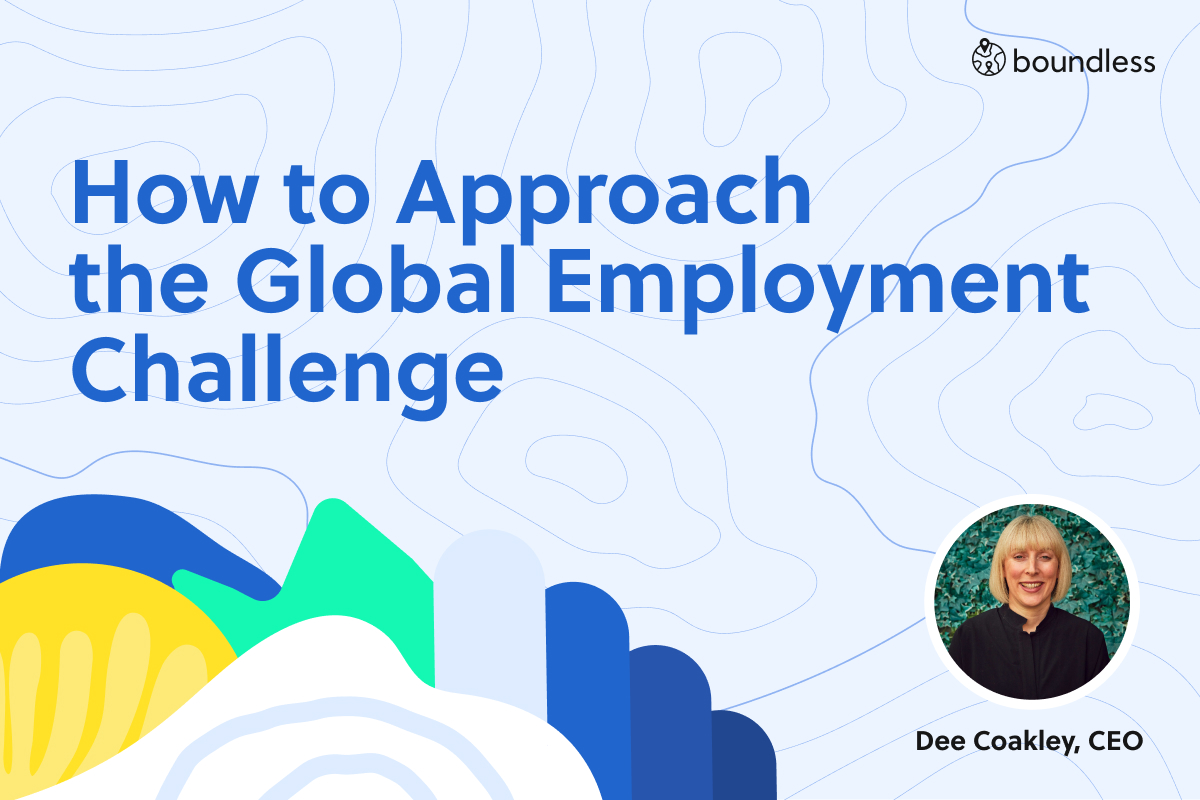
Learning the ropes of managing an international workforce is worth it because of global employment's value to your business. Opening up to cross-border employment helps attract talent, democratises access to well-paid jobs, fosters the well-being of employees, and creates more diverse organisations.

Becoming an effective compliant remote company may not be a unicorn kind of narrative, but it's good for business, especially in a time of a pandemic, as it puts people's well-being and safety first.
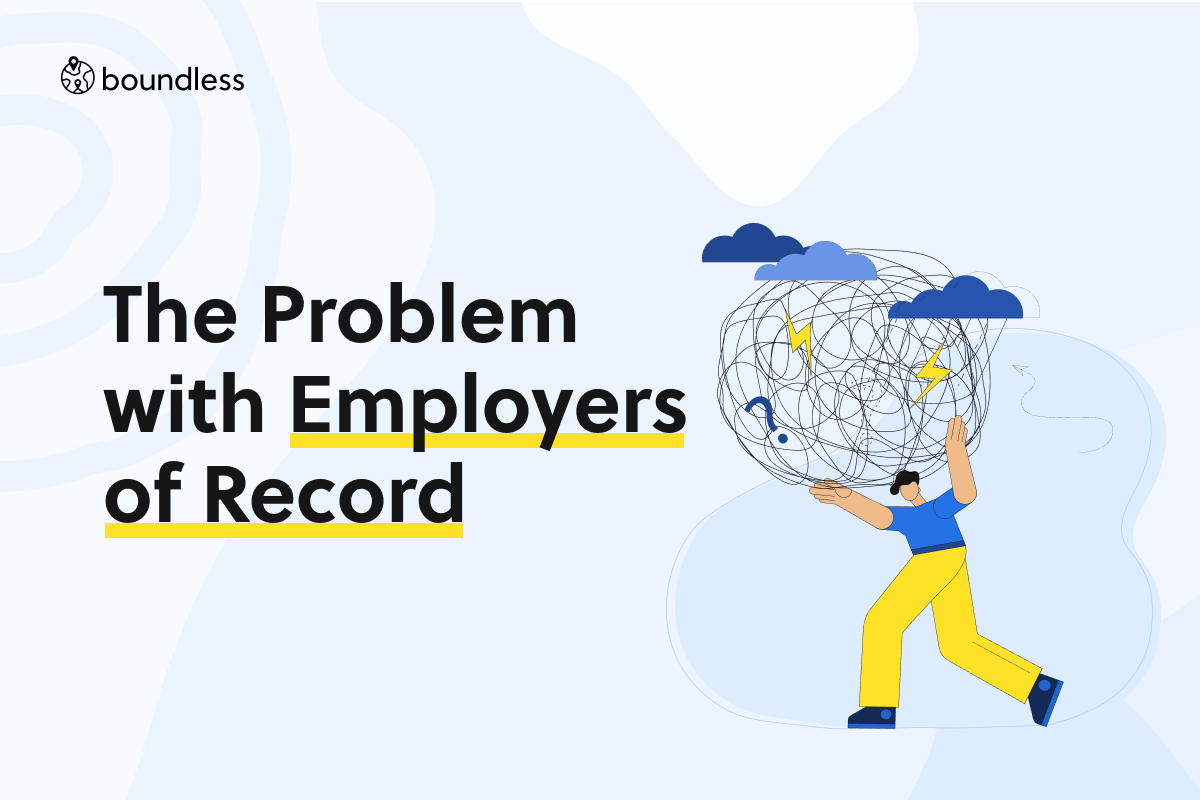
Building a global employment solution comes with a constant stream of choices. How do you operate in each country? What employment model is best? The list goes on. It’s our job to answer these questions with ironclad compliance in mind and in customers' best interest so they are not at risk.